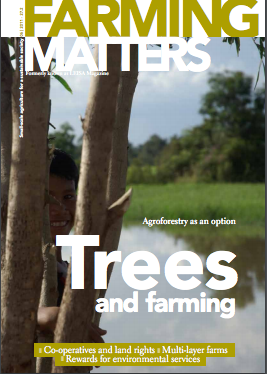Opinion: There is little to celebrate during this International Year of Forests, says Francisco Caporal
International year of the forest 2011Because of its growing demand for inputs and energy, it is increasingly evident that the Green Revolution approach is environmentally unsustainable. But also, and most of all, it is unsustainable because it has an inherent tendency to reduce biodiversity. It is not just a coincidence that the degradation of different Brazilian ecosystems is directly related to the advance of monocultures and the use of chemical inputs, along an ever-expanding “agricultural frontier”. While the destruction of our ecosystems began 500 years ago, there is no doubt that the greatest damage has occurred seen since the “modernisation process” started in the 1960s.
Figures recently released by the Brazilian Ministry of the Environment are alarming, and contradict reports published by many other organisations. The Pampa Gaucho, in the southern state of Rio Grande do Sul (which borders Argentina and Uruguay) has already lost 54% of its original forests, mostly as a result of the new soybean farms, livestock, and, more recently, the large-scale plantation of trees for pulp. The Brazilian Cerrado, with a total area of more than 2 million km2, has already lost 48% of its original cover. The changes seen in the states of Maranhão, Tocantins and Bahia show the enormous impact of the soy industry, with 85,000 km2 lost between 2002 and 2007. The same has been seen in the Mata Atlántica, where the production of ethanol has led to a loss of 75 percent of the forested area. The government has frequently mentioned positive trends in the Amazon region, yet the figures released show that the loss rate of forested areas in the state of Amazonas actually grew by 91 percent. Upward trends are also reported for the states of Rondônia and Maranhão.
Notwithstanding this bleak picture, the Brazilian Minister of Agriculture had the affront to say, in an interview last March, that the intensification of agriculture in areas like the Cerrado “does not have any environmental impact”. The Brazilian authorities feel able to continue supporting the current policies of producing and exporting commodities without any worries. Yet, considering how much we are losing in terms of forests and biodiversity, there is a lot to worry about and, during this International Year of Forests, very little to celebrate. Only those behind these policies are celebrating. We should ask them if they’ll continue celebrating in a few years when even more has been lost. I am starting to worry for my grandchildren.
Text: Francisco Roberto Caporal
Francisco Roberto Caporal, lectures at the Federal Rural University of Pernambuco, Brazil. He is also President of the Brazilian Association of Agroecology.
Email: caporalfr@gmail.com

